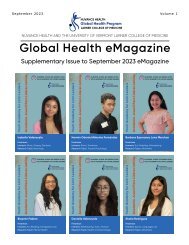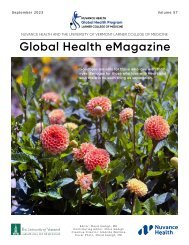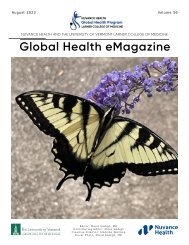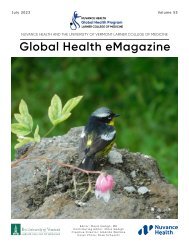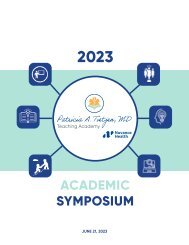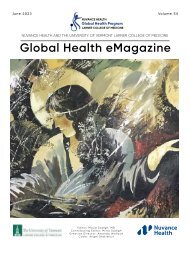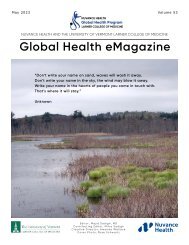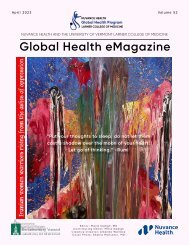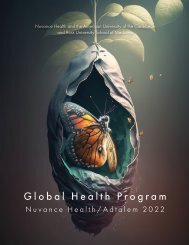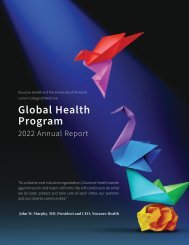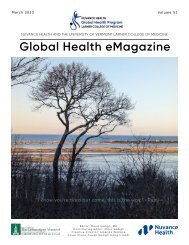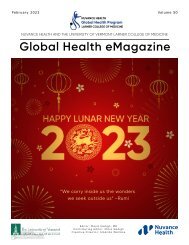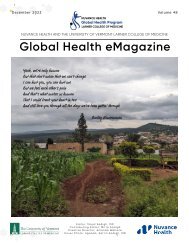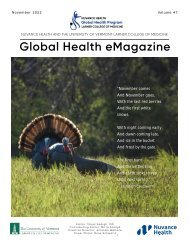eMagazine January 2023
You also want an ePaper? Increase the reach of your titles
YUMPU automatically turns print PDFs into web optimized ePapers that Google loves.
OUR PEOPLE,<br />
OUR MISSION<br />
Global Health<br />
<strong>eMagazine</strong><br />
<strong>January</strong> <strong>2023</strong><br />
Perspective<br />
Highlights<br />
Reflections<br />
Innovation and Technology<br />
Nursing Division<br />
Women’s Health Education<br />
Global Local<br />
Art to Remind Us of Who<br />
We Can Be<br />
Article of the Month<br />
Video of the Month<br />
Our Beautiful Planet<br />
Welcome<br />
Congratulations<br />
Among the Letters<br />
Global Health Family<br />
Calendar<br />
Photo News<br />
Photo Gallery<br />
Resources<br />
A Contented Eye Sees No Faults<br />
Written by Ali Sadeghi<br />
Senior student at AUC<br />
The ideas I tried to convey in my first<br />
reflection were brought to an abrupt halt<br />
due to my inability to formulate my ideas into<br />
words. I would jot down small notes as the<br />
days passed and allowed them to simmer<br />
on the backburner. Ibn-Arabi was not the<br />
only Muslim philosopher to place great<br />
emphasis on the importance of the heart<br />
to the human state. Ibn Ata-llah considered<br />
the root of every disease to be man’s selfsatisfaction.<br />
And Ghazali described the heart as the most important organ,<br />
both literally and figuratively. He explained its role in human subjectivity,<br />
identity, and the way we go about understanding the world around us. The<br />
reason I continue this conversation regarding the heart is that I have no other<br />
way of describing what it is that I have witnessed and experienced while<br />
interacting with patients both in Naggalama, Uganda and now in the rural<br />
village of Sawangi, India.<br />
This central region of India is considered the “oral cancer capital of the<br />
world.” An unprecedented 45% of cancers in men are directly attributed<br />
to their cultural practice of chewing tobacco. In the state of Maharashtra,<br />
one in three people consume smokeless tobacco products. The university’s<br />
newly-built oral cancer hospital is the hub for patients undergoing surgeries<br />
for squamous cell carcinoma of the oral mucosa. Most cases involve wide<br />
local excision of the lesion, partial glossectomy and mandibulectomy with<br />
neck dissections, and reconstruction using the pectoralis major. The patients,<br />
many of whom are on the state’s government-sponsored insurance plan,<br />
travel many hours by public transportation to have the surgery completed.<br />
This healthcare catastrophe cannot be understood without understanding<br />
the local traditions and norms.<br />
The ethical and moral answers are only determined by the perspective of<br />
reality adopted by the individuals and the community they form. While it is<br />
easy to be a keyboard warrior and proclaim the necessity for improved public<br />
health education and promotion to curb all forms of smokeless tobacco, it is<br />
a naïve comment to make. Cultural and behavioral changes will not come<br />
about by “educational promotion.” Understanding of this phenomena and<br />
understanding at the local level operate on different planes. While the cost<br />
estimate for this national health burden may be important for policymakers,<br />
as a student witnessing radical change in patients’ diminished quality of life<br />
post-surgery, surgery is not the ultimate solution. Primary prevention is. If only<br />
the solution was as straightforward as pointing the finger at the culprit.<br />
13




